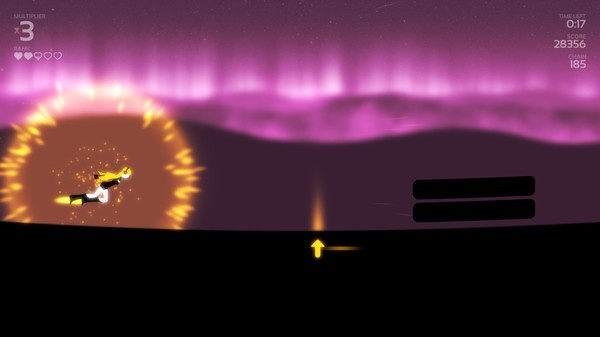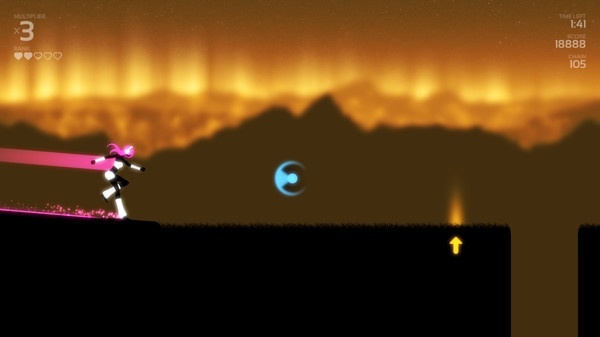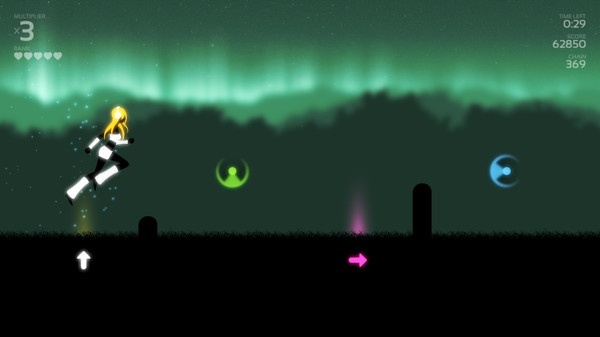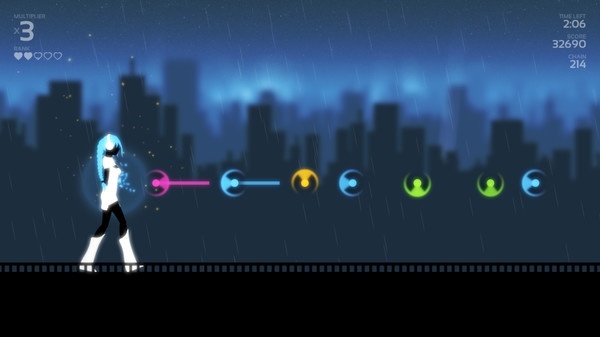Melody's Escape (PC) Review
By Aria DiMezzo  27.05.2016
27.05.2016

There's no shortage of rhythm games these days, even though the Guitar Hero craze has fell away; titles like Just Dance 2016 are still successful, and, of course, the Dance Dance Revolution franchise still exists. The genre has never done exceptionally well on PC, and Icetesy SPRL aims to resolve that with Melody's Escape. While its stunning graphics are enough to catch the eye, is there enough to catch the ear? Cubed3 dances with its fingers.
"Run to the rhythm of your own music," reads the tagline, which is certainly something that people have wanted for a long time with rhythm videogames. Since the beginnings of the Rock Band/Guitar Hero fad, players have asked for the ability to use their own music - after all, how hard could it be to write an algorithm that reduces the song into a note chart? "Extremely," it turned out, but to do something simpler, such as just isolating the beat, is a much simpler thing to do.
For the most part, that's what Melody's Escape does, and the result varies wildly from "masterful" to "it's literally just throwing a random note at me on each half-beat." This is an endless runner where the avatar cannot die, and where the level's layout is generated from an analysis of player-selected music tracks, though some songs are also included. Musicians hoping for something more complicated than just having button presses timed to up-beats and down-beats, however, are going to be disappointed. There appears to be no recognition of verses and choruses, or even of simple measures. One gets the impression that musicians were consulted rather sparingly during development, if at all.

It's jarring to play through a standard rock song and expect that a given measure might consist of "up, down, right, up, down," and that a given verse would repeat that pattern four times, only to find that the button presses are completely random from one measure to the next. The same notes and beats of one instance may generate the aforementioned pattern, while "down, down, right, down, up" is generated when that measure is repeated. Further refinement of the analysis algorithm was certainly needed, even if there's no need to go as deeply into it as necessary to create an actual note chart.
The result feels more like pressing a random key to the beat of the song, and that's okay, as a concept - it just doesn't really take a videogame to happen. One can get the same effect by tapping a foot to the music; Melody's Escape simply includes some really neat visual effects and a scoring system that awards points for how well the beat is kept. "Run to the beat of your own music," would have made a more accurate tagline, even if a non-musician might not see the point of the distinction.

That's a lot of bashing for something that is actually a lot of fun to play. It is accurate to point out that this can be played "to your own music," and it guarantees that everyone will love the soundtrack. In addition, musicians can surely use their own original music, and it works well - even if it does become really bare and boring when odd time signatures are used. Even without jumping to 11/8 time, however, some songs don't work very well. Pink Floyd's "Have a Cigar" yields a masterful, beautiful, and incredibly fun level, while A Perfect Circle's "Judith" causes what might be generously described as "bedlam." On the other hand, Tool's "Right in Two," which is comprised of the aforementioned 11/8, is handled exceptionally well, while Korn's "No Way" is generally boring and bare.
Most importantly, however, is the way that Melody's Escape violates human psychology. When the last fifteen button indicators have been in the air, and the sixteenth is suddenly on the ground, and therefore positioned horizontally lower than the last button press, every human instinct screams that the next button "must" be Down. It, however, can be any of the four, and the colour distinctions (each one is signified by its own colour) do not override that basic instinct.

Sometimes buttons are held, sometimes they are pressed, and this is another place where there is a conflict between the game and how human brains work. Held buttons are indicated by a bar that succeeds the actual button itself, and where the actual button indicator is positioned on the bar is entirely unrelated to which one actually needs to be pressed. When there is an icon on the left side of a bar, the brain immediately interprets that to "press and hold the left key," but this isn't the case in here, since even the right arrow is positioned on the left of the bar, and, once again, the colour is not enough to undermine the overwhelming sensation that an indicator wanting the "right" key to be held would actually be on the right of the bar.
Only these two control issues are major, but further enhancement of the algorithm, as well as a recognition of verses and choruses would be spectacular. This doesn't change the entertainment that is on offer, though, and the beautiful graphics help it along. Although this may just be a glorified way of tapping a foot to the rhythm, visualizations built into Windows Media Player don't come close to matching what is on offer here. It's a clever videogame; fun to play, great to look at, and awesome to hear.

Cubed3 Rating
Very Good - Bronze Award

With a bit of refinement to how songs are turned into stages, and with a bit of touching up to the layout problems that conflict with subconscious expectations, Melody's Escape could genuinely be one of those phenomenal indie games that take the world by storm. Although it functions exceedingly well and is a great joy to play, a few flaws seriously hinder the experience. Either it quickly becomes apparent that the stages consist of mashing random keys to the beat of player-provided songs, or frustration results from the many misses that occur because of conflicting information.

![]() 7/10
7/10
![]() 0
(0 Votes)
0
(0 Votes)
 Out now
Out now  Out now
Out now  None
None  Out now
Out now Comments
Comments are currently disabled

 Sign In
Sign In Game Details
Game Details Subscribe to this topic
Subscribe to this topic Features
Features





 Top
Top

